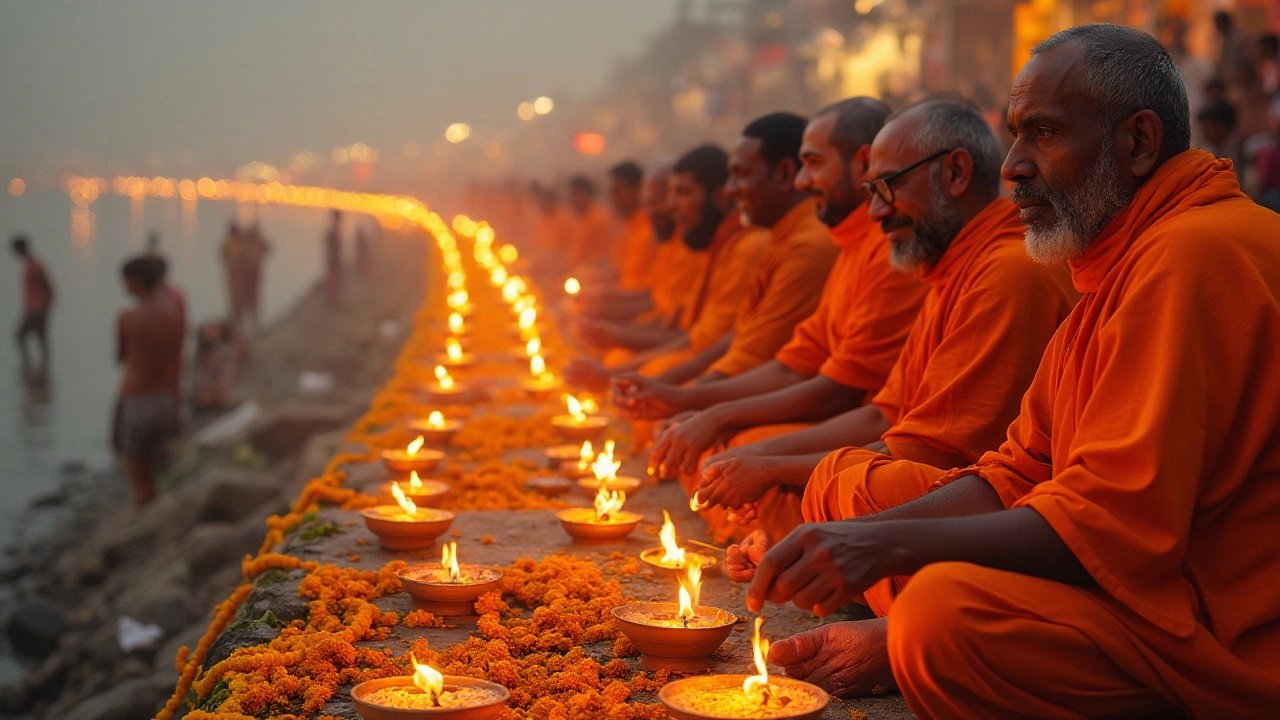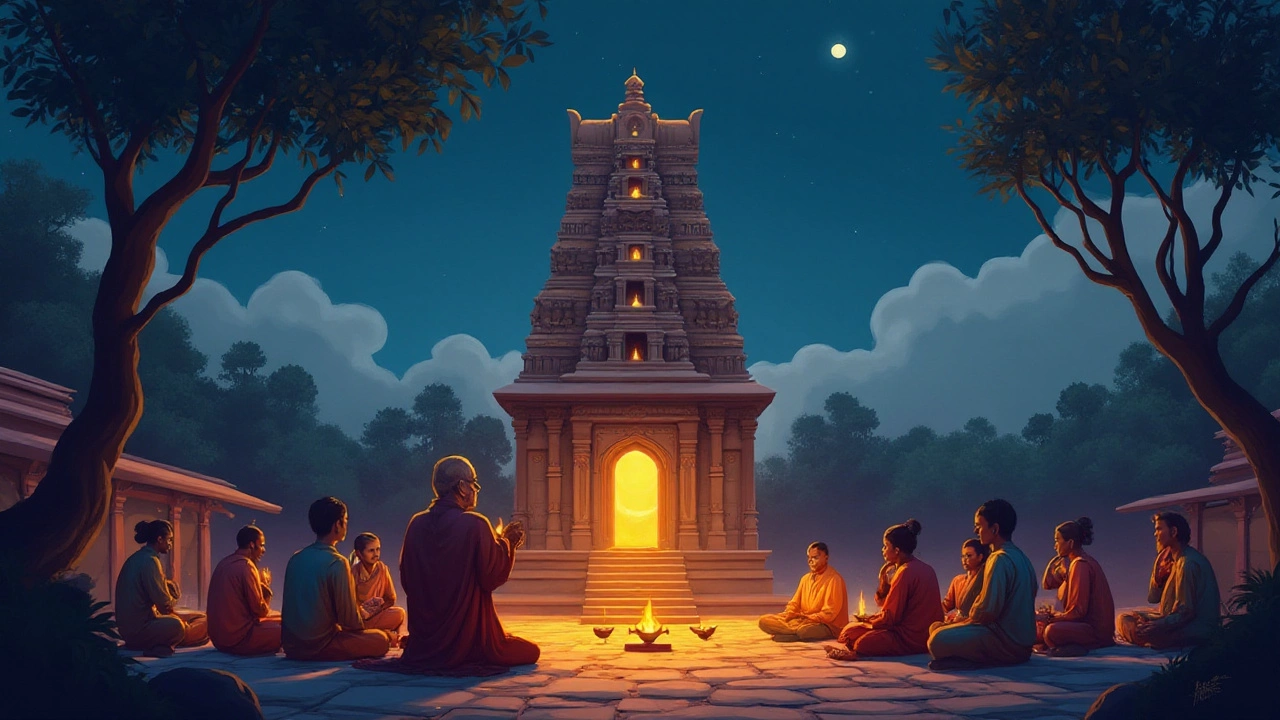India's spiritual landscape is as diverse as its geography, home to traditions that have been cultivated over millennia. Here, spirituality isn't simply a part of life; it's woven into the very fabric of society, offering a vast array of practices that aim to elevate the mind and nourish the soul.
Whether it's finding tranquility through meditation or partaking in the vibrant ceremonies of the nation's numerous festivals, those who delve into these practices find themselves becoming part of a greater, timeless dialogue. In India, the journey of the spirit is both deeply personal and beautifully communal, inviting all to explore its mysteries.
- Meditation and Mindfulness
- Ayurveda and Healing Rituals
- Yoga: Union with the Divine
- Festivals and Ceremonial Practices
- Spiritual Journeys and Pilgrimages
Meditation and Mindfulness
Meditation is often considered the heart of spiritual practices in India, a tradition deeply embedded in the culture's quest for understanding the mind and enhancing spiritual growth. This practice, both ancient and relevant, involves the art of focusing the mind and fostering a state of awareness, often leading to a profound sense of peace and clarity. Historically, meditation in India is rooted in Hindu and Buddhist philosophies, where it has been a central component of spiritual enlightenment and self-discovery. The techniques can vary widely, ranging from mindfulness and concentration exercises to more advanced forms of contemplation and visualization.
One of the cornerstones of Indian meditation is the practice of mindfulness, which involves being completely present in the moment, attending to each thought or sensation without judgment. This approach encourages practitioners to cultivate an intimate understanding of their mental processes, promoting a sense of balance and emotional resilience. The ancient texts, such as the Bhagavad Gita and the Yoga Sutras of Patanjali, offer detailed insights into the nature of meditation, providing not just techniques but also philosophical frameworks that highlight the goal of merging the mind with the universal consciousness. Such teachings reinforce the idea that meditation is not merely an escape but a way to engage deeply and authentically with life.
According to a study published in the Journal of Behavioral Medicine, regular meditation practice is associated with reduced stress, improved emotional health, and enhanced self-awareness. These findings resonate with the experiences of countless individuals who have embraced meditation as a tool for self-improvement and spiritual well-being. Swami Vivekananda, a revered thinker, once said,
"Meditation can turn fools into sages but unfortunately fools never meditate."His words echo the transformative potential meditation holds for those willing to explore its depths.
The integration of breathing techniques, known as pranayama, often complements meditation practices in India. Pranayama involves controlled, conscious breathing that aids in stabilizing emotions and concentrating the mind. When combined with meditation, pranayama has been shown to enhance mental clarity and reduce anxiety levels significantly. This holistic approach to mental well-being underscores India's dedication to both the physical and spiritual dimensions of existence, emphasizing the need for harmony between body, mind, and soul.
For those new to the practice, beginning with simple mindfulness exercises can be an effective way to start. Setting aside just a few minutes daily to focus on the breath, observe thoughts without attachment, or practice loving-kindness meditation can cultivate a profound change in one's outlook and overall demeanor. Helpful guides and apps focusing on meditation and mindfulness have made these ancient practices more accessible globally, allowing users from different backgrounds to discover the powerful tools of self-awareness and inner peace that have been a hallmark of India's spiritual heritage for centuries.
Ayurveda and Healing Rituals
The ancient science of Ayurveda, known for its holistic approach to health, is one of India's cherished gifts to the world. Dating back over 3,000 years, Ayurveda means 'science of life' in Sanskrit and emphasizes the balance of body, mind, and spirit. This traditional system of medicine is based on the belief that well-being is achieved through the delicate balance of the three life forces known as doshas — Vata, Pitta, and Kapha. Unlike Western medicine, which often focuses on treating symptoms, Ayurveda seeks to address the root cause of ailments through natural and personalized treatments.
Central to Ayurveda is the belief that each person has a unique constitution that determines their physical and mental characteristics. Practitioners use a wide range of therapies to balance these doshas, including dietary changes, herbal remedies, yoga, meditation, and detoxification processes such as Panchakarma. Panchakarma involves a series of five cleansing rituals believed to purify the body and rejuvenate the senses. It requires guidance from a skilled practitioner who tailors each treatment to the individual's specific needs.
Ayurveda's many healing rituals also include the use of medicinal plants and herbs, many of which have been studied and validated by modern science. For example, turmeric, renowned for its anti-inflammatory properties, has become a popular supplement worldwide. Meditation and yoga are integral to Ayurveda, as they enhance mental clarity and physical vitality. These practices aim to bring harmony and equilibrium, encouraging individuals to live in sync with nature and listening to their inner selves. In recent years, Ayurvedic principles have gained global recognition, with millions seeking natural ways to boost immunity and promote long-term health.
"Ayurveda is the art of daily living in harmony with the laws of nature. It is a science of love that brings to life the timeless wisdom of how to live with health, happiness, and abundance." — Vasant Lad, renowned Ayurvedic physician.
As Ayurveda continues to grow in popularity, it remains an intrinsic part of India's identity and spiritual heritage. Many travelers flock to the country seeking authentic Ayurvedic retreats, combining luxury with traditional healing practices. These retreats offer an escape from the modern world's chaos, inviting guests to embark on transformative journeys of self-discovery and healing.
Remarkably, Ayurvedic practices have influenced other health systems, including traditional Chinese medicine and homeopathy. This ancient science reminds us of the importance of understanding our unique body types and striving for balance to achieve optimal health. For those intrigued by natural healing and well-being, Ayurveda provides a profound and timeless guide.

Yoga: Union with the Divine
Yoga is one of India’s most cherished gifts to the world, drawing practitioners from all corners of the globe. Its origins date back thousands of years, crafted by ancient sages who understood the profound connection between the mind, body, and spirit. The word “yoga” itself stems from the Sanskrit root ‘yuj,’ which means ‘to unite’ or ‘to join.’ This union extends beyond the physical postures we often associate with yoga today; it represents a deeper connection with the inner self and, ultimately, the divine.
The practice of yoga aspires to balance the self through various means, involving not just physical exercises but also ethical precepts, breathing techniques, and meditation. Among the traditional paths of yoga prescribed in classical texts, Hatha Yoga focuses on postures (asanas) and the alignment of the body, while Bhakti Yoga channels emotional energy through devotion. Jnana Yoga seeks wisdom through study and contemplation, and Karma Yoga finds fulfillment through selfless action. Each path offers a unique approach, yet all converge in the quest for spiritual enlightenment and peace.
One cannot explore yoga without recognizing its philosophical underpinnings, which are captured within the Yoga Sutras of Patanjali. This ancient text, composed of 196 sutras, lays the foundation for the practice and theory of yoga. Patanjali’s wisdom guides practitioners through an eight-limbed path, ensuring the journey encompasses multiple facets of life, from ethical disciplines (Yama and Niyama) and posture (Asana) to breath control (Pranayama), sensory withdrawal (Pratyahara), concentration (Dharana), meditation (Dhyana), and finally, a state of blissful liberation (Samadhi).
In contemporary times, yoga has evolved, adapting various styles and interpretations to meet diverse needs. Modern icons like B.K.S. Iyengar and K. Pattabhi Jois have championed distinct methodologies that emphasize precision and movement. Regardless of style, yoga encourages practitioners to explore their own boundaries, not just physically, but as a holistic endeavor that ties together all aspects of life. Yoga serves as a reminder that, much like India itself, the journey is multifaceted, and every twist and turn offers a chance for learning and growth.
"Yoga is the journey of the self, through the self, to the self." – The Bhagavad Gita
It’s fascinating to note that scientific studies have begun to validate what yogis have known for centuries. Regular practice has shown benefits, including reduced stress, improved focus, enhanced flexibility, and a greater sense of well-being. According to a study conducted by Harvard University, individuals who engage in yoga consistently report feeling more connected to their body and mind. This underscores yoga’s enduring allure and its capacity to enrich lives, fostering a mindfulness that transcends the confines of the mat.
As India continues to share its ancient practices, yoga's presence in global culture can be felt in bustling studios and quiet living rooms alike. It invites each practitioner to embark upon a personal pilgrimage, to find stillness in movement, and connect with the serenity that lies within. Through the art of yoga, the vibrant tapestry of India's spiritual landscape unfolds, offering an oasis of calm in an often tumultuous world, bridging the gap between the mundane and the divine.
Festivals and Ceremonial Practices
India's spiritual practices are intricately linked with its vibrant festivals and ceremonial customs, which mirror the country's rich cultural tapestry. These celebrations are much more than mere social gatherings; they offer a deep spiritual experience, reaching into the history and mythology of the nation. For many, participating in these events is an opportunity to reset spiritually and emotionally, marking significant passages of time with joy and reverence.
One of the most renowned festivals is Diwali, often called the Festival of Lights, which symbolizes the victory of light over darkness and knowledge over ignorance. People across India light lamps, clean their homes, and engage in prayers, symbolically inviting positivity and prosperity into their lives. This festival fosters a sense of community and renewal, as families exchange sweets and gifts, sharing the warmth of the celebration with neighbors and strangers alike.
Another notable festival is Holi, the Festival of Colors, celebrated in the spring. It represents the arrival of spring and the triumph of good, bringing people together in a playful yet meaningful manner. On this day, the boundaries of age, status, and sometimes even social obligations blur as people throw colored powders on each other, dance to music, and share laughter. This festival reminds participants of the importance of letting go of past grievances and renewing friendships.
Each festival carries its unique rituals, all deeply rooted in mythology and spiritual teachings. For instance, Navaratri is a long celebratory period that honors the divine feminine, known as Maa Durga. During these nine nights, devotees participate in fasting and dance forms known as Garba and Dandiya. These rituals and dances express gratitude and devotion, engaging participants in acts that purify the body and energize the spirit. Such festivals highlight the important place women hold in Indian culture, both in mundane and sacred realms.
"Festivals are a reflection of life, mirrored in a sea of colors, music, and spirituality," notes acclaimed writer Terrence Russell. His observation succinctly captures the beauty and diversity of Indian festivities.
India's ceremonial practices also extend to numerous life events, such as births, marriages, and deaths, each marked by specific rites and rituals that reflect spiritual beliefs. In weddings, for example, the chanting of Vedic mantras and the sacred fire ritual known as Saptapadi—where the couple takes seven steps before the sacred fire—symbolize the bonds of marriage and the mutual commitments made before deities.
Such cosmic ceremonies hold more than a religious significance; they help individuals connect with something greater than themselves. These practices remind us all that spirituality isn't a solitary journey but rather one that involves the shared path and collective wisdom of a community joined in ritual and celebration.

Spiritual Journeys and Pilgrimages
In the heart of India's spiritual tapestry lies its profound tradition of pilgrimages, offering enthusiasts a path that merges the physical journey with spiritual awakening. This sacred practice, known as 'Yatra,' is more than just a journey; it's a pilgrimage that tugs at the soul and promises enlightenment. Enveloped by centuries-old practices, **spiritual journeys** here guide believers towards revered destinations, each with its unique significance and history. Whether it's the timeless serenity of the Himalayas or the ancient vibrancy of the Ganges at Varanasi, these journeys provide an opportunity to step away from the mundane and engage with the divine. Stallholders lining the paths sell incense, flowers, and sacred threads, enveloping travelers in fragrant clouds that hint at the divine destinations ahead. Each step taken on these journeys is imbued with devotion, a growing anticipation of reaching a place where one might feel the touch of divinity more strongly than the temple down the street.
The ancient sage Adi Shankaracharya once said, "The belief that going on a pilgrimage washes sin away finds a place in the heart of the believer alone; for those who walk it with conviction, the journey itself becomes the way to freedom."Each pilgrimage site in India is attached to myriad legends and stories that affirm its spiritual importance. At Haridwar, pilgrims gather to take a holy dip in the Ganges River to cleanse their sins, believing in the river's divine capacity to purify them physically and spiritually. Meandering through the ancient alleys and temples, stories of faith, redemption, and divine intervention echo from pilgrims of decades gone by, wrapping current travelers in a legacy of belief.
The practice of trekking the **spiritual journeys** can often be challenging, requiring stamina, resilience, and an unwavering spirit. The arduous Kailash Mansarovar Yatra is one such journey where tourists and locals alike brave harsh and changing climates to reach sites considered the abode of Lord Shiva. Enveloped in snow-capped mountains and serene waters, this pilgrimage stands as a testament to a blend of natural beauty and spiritual significance. Along the demanding route, camaraderie forms among travelers, unified by shared adversity and the anticipation of a shared awe at their journey's end.
Preserving Cultural Traditions Through Pilgrimage
In modern times, Indian pilgrimages preserve cultural traditions, safeguarding them for future ge erations. They encapsulate India's diverse spiritual fabric, inviting a reflection on ancient values in a contemporary world. Ratha Yatra in Puri, where Lord Jagannath journeys through crowded streets on towering chariots, epitomizes the grandeur and spiritual fervor that draw thousands to partake in this sacred annual event. Beneath the towering figure of their god, devotees dance with the music of ancient chants resounding all around, lost in the sheer experience of unshaken faith.
Today, these pilgrimages attract people of all creeds who wish to transcend borders and unite in shared reverence. Despite modern advancements, pilgrimage sites encapsulate enduring spiritual teachings that transcend a rapidly evolving society. As the world becomes smaller, the call of these historic, sacred sites grows louder, drawing soul seekers and wanderers alike into the mesmerizing embrace of India's ancient spiritual practices.
